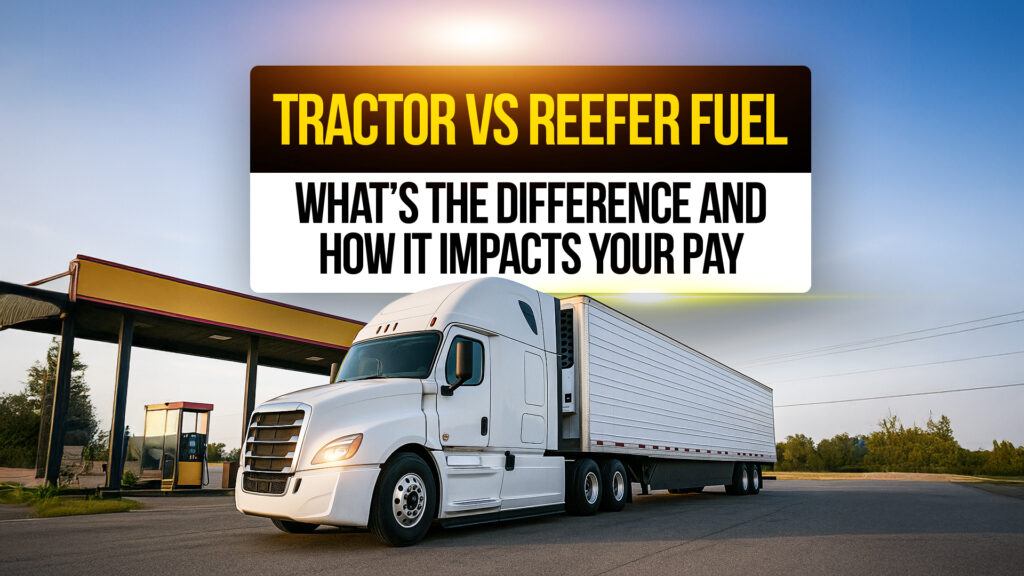
Ever wondered why your fuel receipts list tractor fuel and reefer fuel separately? You’re not alone. Whether you’re a company driver, lease operator, or owner-operator, understanding the difference between tractor and reefer fuel can have a real impact on your bottom line. In this post, we’ll break down what each one does, who usually foots the bill, and what that means for your take-home pay.
What’s Really Going On with Tractor vs Reefer Fuel?
Tractor fuel powers your truck’s engine. Reefer fuel, on the other hand, runs the refrigeration unit on a refrigerated trailer. That means if you’re hauling fresh produce, meat, dairy, or any temperature-sensitive freight, you’re likely dealing with reefer fuel.
A reefer unit is essentially a diesel-powered generator, completely separate from the tractor. It keeps freight at the right temperature during the haul and often while sitting at docks too.
Why it matters: Reefer units can burn 0.5 to 1 gallon of fuel per hour, depending on the load and settings. That adds up, especially if you’re responsible for the cost.
Pros, Cons & What to Watch Out For
Here’s how it breaks down for different types of drivers:
Company Drivers
- ✅ Usually not responsible for reefer fuel
- ❗ But may be expected to monitor usage or log readings
- 🚫 Can be docked pay for improper temp settings or fuel mismanagement
Lease Operators & Owner-Operators
- ✅ Some contracts include reefer fuel reimbursement
- ❗ Others leave it entirely up to the driver
- ⚠️ Fueling at truck stops? Make sure you’re using dyed diesel at the reefer pump to avoid higher taxes and fines
Watch out for:
- Reefer fuel theft: Always lock your tank, reefer fuel is untaxed and a target
- Fuel mischarges: Check your statements; some fuel islands combine charges
What It Means for Your Job (or Career Path)
If you’re deciding between dry van vs. reefer, or thinking about moving into a lease purchase program, understanding fuel responsibility can make or break your profitability.
Ask these questions before accepting a reefer job:
- Who pays for reefer fuel?
- Is reimbursement automatic or do I submit receipts?
- What temp settings am I responsible for monitoring?
- Are there penalties for incorrect use?
Knowing the answers up front helps avoid surprise deductions and keeps your pay predictable.
Not Sure What’s in Your Contract?
That’s exactly why Drivers 1st exists. We’re not here to push you, we’re here to help you make a move when you’re ready. Our team helps drivers like you compare job offers and understand the fine print, fuel charges included.
How to Take Action or Apply
If you’re hauling reefer or thinking about switching, here’s what to do next:
- Review your current contract or lease terms
- Track your fuel expenses, both tractor and reefer
- Compare reefer vs. dry van rates (reefer typically pays more, but not always enough to offset costs)
- Talk to a driver advocate before signing anything new
→ Compare CDL Jobs with and without Reefer
→ Talk to a Driver Advocate (No Pressure)
Conclusion
Tractor and reefer fuel aren’t the same, and if you’re paying the bill, it matters. From who’s responsible to how it affects your paycheck, the details can make or break a job offer.
Your license is your business, make it work for you.
Whether you’re ready to switch gears or just want to see what’s out there, Drivers 1st is here when you are. No pressure. Just better options.
For more updates and insights into the trucking world, stay tuned to Drivers1st.com!